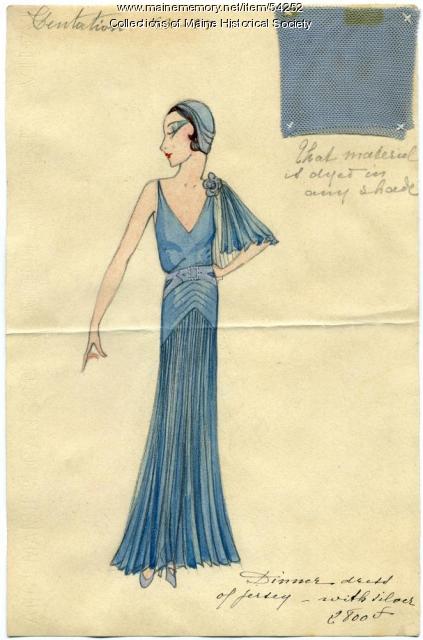Keywords: printed fabric
- Historical Items (55)
- Tax Records (0)
- Architecture & Landscape (0)
- Online Exhibits (16)
- Site Pages (22)
- My Maine Stories (1)
- Lesson Plans (0)
Online Exhibits
Your results include these online exhibits. You also can view all of the site's exhibits, view a timeline of selected events in Maine History, and learn how to create your own exhibit. See featured exhibits or create your own exhibit
Exhibit
Silk Manufacturing in Westbrook
Cultivation of silkworms and manufacture of silk thread was touted as a new agricultural boon for Maine in the early 19th century. However, only small-scale silk production followed. In 1874, the Haskell Silk Co. of Westbrook changed that, importing raw silk, and producing silk machine twist threat, then fabrics, until its demise in 1930.
Exhibit
For one hundred years, Acadia National Park has captured the American imagination and stood as the most recognizable symbol of Maine’s important natural history and identity. This exhibit highlights Maine Memory content relating to Acadia and Mount Desert Island.
Exhibit
Settlers' clothing had to be durable and practical to hold up against hard work and winters. From the 1700s to the mid 1800s, the women of Maine learned to sew by making samplers.
Exhibit
Northern Threads: Silhouettes in Sequence, ca. 1780-1889
A themed exhibit vignette within "Northern Threads Part I," featuring a timeline of silhouettes from about 1775 through 1889.
Exhibit
Northern Threads: The rise and fall of the gigot sleeve
A themed exhibit vignette within "Northern Threads Part I," featuring the balloon-like gigot sleeve of the 1830s.
Exhibit
Northern Threads: Outerwear, Militia & Cadet uniforms
A themed vignette within "Northern Threads Part I," featuring 19th century outerwear, bonnets, militia and cadet uniforms.
Exhibit
Home: The Wadsworth-Longfellow House and Portland - Researching Your Home
"… of a building's history include the building fabric and physical features found on the property, paper records found in libraries and government…"
Exhibit
Cosmopolitan stylings of Mildred and Madeleine Burrage
Born in Portland, sisters Mildred Giddings Burrage (1890-1983) and Madeleine Burrage (1891-1976) were renowned artists and world travelers. Mildred's experiences studying painting in Paris and Italy, and the sisters' trips to Mexico and Guatemala inspired their artwork and shared passions for cosmopolitan and stylish attire. Housed at Maine Historical Society, The Burrage Papers include selections of original advertising drawings called "line sheets" from Parisian fashion houses dating from 1928 to 1936. Images of Madeleine's gemstone jewelry and Mildred's artwork accompany intimate family photographs of the sisters.
Exhibit
The mainspring of fashion is the process whereby members of one class imitate the styles of another, who in turn are driven to ever new expedients of fashionable change.
Exhibit
Art of the People: Folk Art in Maine
For many different reasons people saved and carefully preserved the objects in this exhibit. Eventually, along with the memories they hold, the objects were passed to the Maine Historical Society. Object and memory, serve as a powerful way to explore history and to connect to the lives of people in the past.
Exhibit
MY ISLAND HOME: Verlie Colby Greenleaf of Westport Island
Verlie Greenleaf (1891-1992) bore witness to over a century of Westport Island's history. Many changes occurred during Verlie's 100-year life. Verlie Greenleaf donated photographs, personal notes, and sat for an interview in 1987, all part of the Westport Island History Committee's collection. Her words frame this exhibition, providing a first-person account of her life.
Exhibit
Dressing Up, Standing Out, Fitting In
Adorning oneself to look one's "best" has varied over time, gender, economic class, and by event. Adornments suggest one's sense of identity and one's intent to stand out or fit in.
Exhibit
In Time and Eternity: Shakers in the Industrial Age
"In Time and Eternity: Maine Shakers in the Industrial Age 1872-1918" is a series of images that depict in detail the Shakers in Maine during a little explored time period of expansion and change.
Exhibit
Immigration is one of the most debated topics in Maine. Controversy aside, immigration is also America's oldest tradition, and along with religious tolerance, what our nation was built upon. Since the first people--the Wabanaki--permitted Europeans to settle in the land now known as Maine, we have been a state of immigrants.
Exhibit
Paper has shaped Maine's economy, molded individual and community identities, and impacted the environment throughout Maine. When Hugh Chisholm opened the Otis Falls Pulp Company in Jay in 1888, the mill was one of the most modern paper-making facilities in the country, and was connected to national and global markets. For the next century, Maine was an international leader in the manufacture of pulp and paper.
Exhibit
Begin Again: reckoning with intolerance in Maine
BEGIN AGAIN explores Maine's historic role, going back 528 years, in crisis that brought about the pandemic, social and economic inequities, and the Black Lives Matter movement in 2020.
















